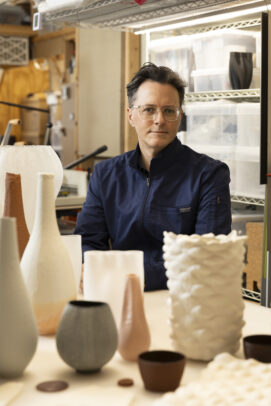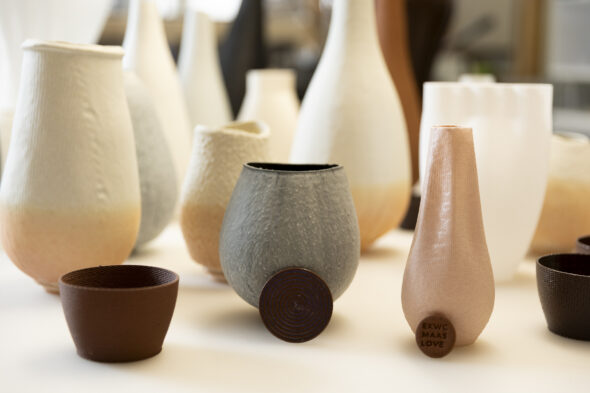With Fulbright award, UIC designer will explore innovations, traditions in ceramic production
The art of producing ceramic objects dates back at least 25,000 years. Ancient civilizations around the world made ceramic pottery, bricks, sculpture and tools using the same basic process: shaping an original object, creating a mold of it from plaster, then filling the mold with clay to make replicas. For much of its more recent history, mass production of ceramics has used that same process.

UIC designer Brian Anderson, associate professor of industrial design, studies both traditional techniques and modern innovations in ceramics. Now, funded by a Fulbright U.S. Scholar Award, he will collaborate with artisans and researchers in Japan to imagine new developments in ceramics that meld local traditions and advanced fabrication technologies. The award will fund Anderson to work in Japan during the 2024-25 academic year and expand his international collaborations focused on ecologically and socially responsive ceramics production.
Anderson’s work in Japan will draw on computer-assisted design (CAD) technologies such as 3D printing and computer-controlled textile production to reconceive the mold. To respond to ecological and societal responsibilities, the project also will prioritize local sourcing and production. Anderson plans to develop new starting materials, partly by repurposing waste and investigating the viability of non-commercial, “wild” clay, clay that is foraged or found in natural settings such as along a lakeshore.
“I look for spaces where interesting experiments can be set into motion that investigate different ways of bringing materials into the world and different ways of using what we produce,” said Anderson, associate professor at the UIC College of Architecture, Design and the Arts.
“Ceramics, as it’s been practiced for thousands of years, is very cumbersome,” Anderson said. “It’s messy. It’s dirty. It costs human and mechanical energy from the point of extraction all the way through the logistics of distribution. I thought this was clearly a place where rigorous creative exploration could be productive.”
In Japan, the Fulbright award will allow Anderson to continue a project called Casting New Traditions, which focuses on ecologically responsive ceramic production. Anderson began the project in 2019 when he was selected as a U.S.-Japan Creative Artists Program fellow. With the funding from that program, he traveled to Japan, where he briefly lived in his youth, and built relationships with academics, local artisans and designers.
Unfortunately, the COVID-19 pandemic prevented him from returning to Japan and derailed what could have been a fruitful collaboration. So instead, Anderson applied for a ceramics residency in the Netherlands, where he experimented with clay and 3D printing. That led to his work with custom-made textiles.
“This project, driven by computer-assisted design, willfully intersects technology and tradition,” Anderson said. “My proof-of-concept explorations, supported by Awards for Creative Activity from the UIC Office of the Vice Chancellor for Research, channel the concept of regeneration. They imagine a future in which agriculture might be harnessed as a less extractive starting point for production.”

Incorporating local practices and materials into ceramics production hopefully will yield environmental and cultural benefits, too, he added. During his Netherlands residency, Anderson aimed to constrain all steps of the production process to within a 200-kilometer radius, ideally by sourcing fiber from Dutch farms and wild clay from the Maas River. In Japan, he will work in Saga Prefecture, a region known for its ceramic tradition.
“There’s a challenge preserving heritage and maintaining knowledge from one generation to the next,” Anderson said. “And there’s also the ideal that it can be developed or directed in ways that are relevant to new markets or that have purpose in culture.”
A third location for this work will be closer to home: southern Illinois, where Anderson plans to focus his innovations and the knowledge he acquires abroad. He hopes his experience with the Fulbright scholarship also will open doors for UIC students to study and work internationally.
“The wonderful thing about the Fulbright, in my opinion, is that it is a node,” Anderson said. “It’s certainly a portal into another world. But at some point, it’s going to have so very many avenues branch from it.”
